
Category: Excellent reporting
Wednesday, January 26, 2011
Letter From Italy: Explaining Why My Pro-Women-Victims Focus In My Forthcoming Movie Samhain
Posted by Stefano Torrese
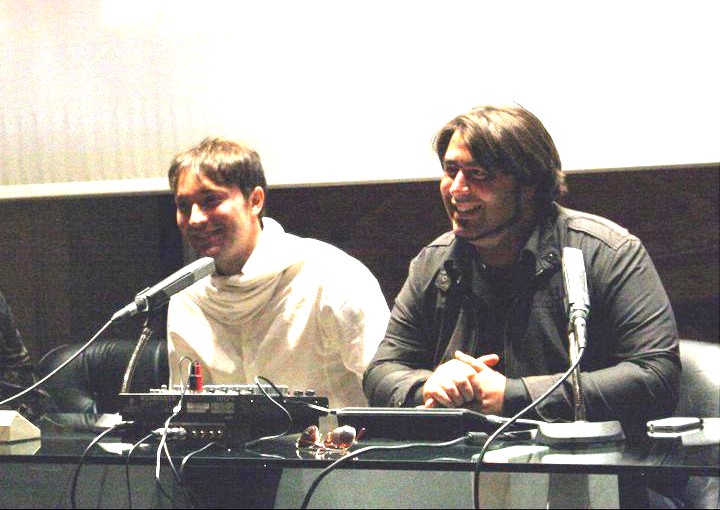
[Above: Stefano Torrese (right) and his co-author and co-producer Diego Antolini discuss Samhain]
While reading Mr. Kercher’s open letters [here and here] we found so many resonances with our ideas and feelings about the sad drama that occurred to Meredith, feelings which had led us to initiate the film project “Samhain - A Halloween Tale”.
Our starting point was to write a story which could deliver a strong message on behalf of all women whose life had ended because of the violence and ignorance of others; to provide our contribution to making people think and re-think about the society we live in, where nobody is safe, children or students or workers.
Then, as we deepened the research into the subject, and more material came out about the judicial case and the trials, we witnessed, as John sadly remarked, a singular yet logical - for our society - phenomenon, that of the rising of a celebrity, who is in fact charged for murder and sentenced to many years in prison.
Last spring we started to see the first buzz in the US about our movie project and those of others. A few months later we heard the inevitable: an American TV production decided to shoot a documentary about AMANDA KNOX’S trial paths.
As fall approached, we trimmed and refined our story into a thriller with a moral, and a big, positive twist in the end, which developed furthermore a strong message. This message we made clear during our first press conference on last October 28, in the Palazzo della Regione of Perugia, the most important institutional house of local government.
We said that our movie is not - and will never be - a movie about Amanda Knox; as a matter of fact it is not even a movie about Meredith in the sense of the exploitation of her image for economic purposes.
“Samhain - A Halloween tale” is a tale with a moral in the classical form, inspired by a true fact (obviously Meredith’s murder) but then touching many other topics like the very ancient celtic name of Halloween “Samhain”, the possibility to mold the timeframe, and other esoteric elements.
The story turns around former FBI agent Bryan Nolan, who left the US following the personal drama of the disappearance of his little sister Susan.
Once in Perugia, he hears about the murder of a young student and after a series of signs and signals, he realizes the spirit of the young girl is trying to establish contact with him; the spirit seeks for peace and justice, and it is also the key to understand what really happened to Bryan’s sister.
As you can tell from this brief synopsis, our story doesn’t contain the Hollywood-like sparkling and kitsch elements prone to making the protagonist a star or a celebrity. Our movie is difficult, and will be difficult to make because it talks about life, death, and the afterlife.
During the last few months we have received pressure from local and international press about what we really want to make, and so we wanted to be clear: if our movie has ever to be linked to Meredith, it would be in her honor, dedicated to her memory, and it would not use her image.
We said this after noticing the hideous growth in terms of popularity of people who are in jail for murder, and yet became a money machine, and also the attitude of the general audience who are being misled and manipulated into the belief that these people in jail shouldn’t be there.
This shocked us and prompted our more immediate action: we can write and we can make movies, so we will make our contribution to the truth by the means of telling a story and deliver a message to the audience:
A GIRL WAS MURDERED, DIED, AND NOT ONLY HER BODY BUT HER MEMORY IS ABOUT TO BE BURIED AND NEVER COME OUT TO LIGHT AGAIN.
We cannot accept that, what happened to Meredith happened - and is happening - to many other girls in the world. We need to remember this. We need to remember Meredith and through her memory, keep this feeling of hope alive, that what happened to her will eventually cease to happen.
We need to disseminate the message as strongly as we can, and perhaps things could change so that Meredith’s drama would not have occurred in vain.
Our hope here is to respectfully share with Meredith’s family and friends an explanation of what’s behind our project, let them know what we are doing before they read it possibly wrongly put in the papers; and encourage their feelings if they wish to guide us.
A good project about a person without deep caring and respect for that person - be she alive or not - would be a failure to begin with. Meredith evokes our deep caring and respect.
[Below, Stefano Torrese and his co-producer Diego Antolini discuss the Italian film industry]
[Below, the interim trailer for Stefano Torrese’s movie Samhain: A Halloween Tale]
[Below, the poster for Stefano Torrese’s movie Samhain: A Halloween Tale]
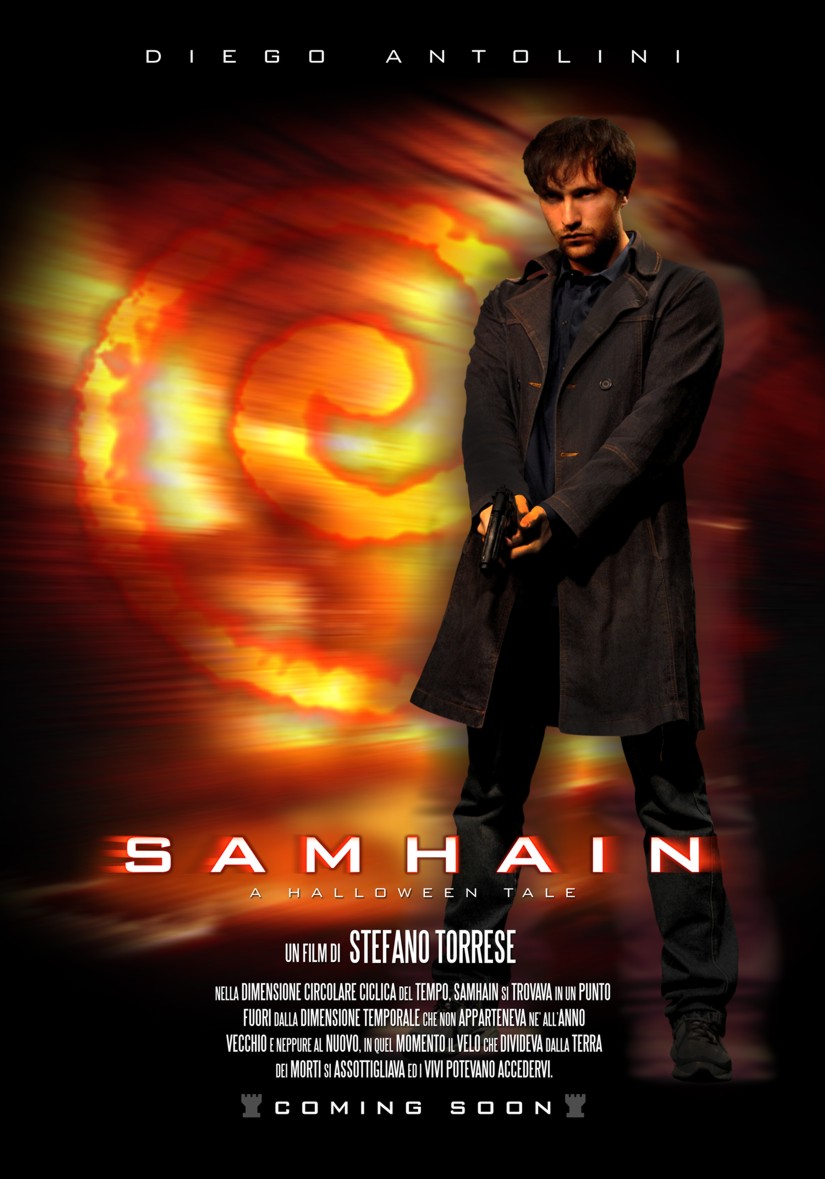
Saturday, December 18, 2010
UK’s Sky News Carries A Pre-Session Report from Nick Pisa In Perugia This Morning
Posted by Peter Quennell
Courtroom images are from the session last Saturday.
Friday, July 09, 2010
Third Of Three Excerpts In Italian from LA7 Program On Meredith’s Case
Posted by True North
Again, thanks to TJMK poster Cesare Beccaria for the video links. We posted some background last Friday.
This is the interview with Rudy Guede’s defense lawyer Walter Biscotti, and the continuation of the re-enactment of the crime - warning: it is very jarring, with graphical shots of Meredith’s room after the crime, and then three figures running and two later kissing.
Walter Biscotti claims to the LA7 reporter Andrea Vogt that Rudy Guede entered the house with Meredith, they talked for a while, and then they had consensual sex. Rudy later goes to the bathroom.
He hears Amanda’s voice enter the house. He hears an argument over money between Meredith and Amanda. While listening to his iPod Rudy hears a loud scream.
When he enters Meredith’s room, he sees her bleeding and tries to stench the flow of her blood with a towel. Rudy hears two people outside the house running away, and he also runs away.
Mr Biscotti cannot explain the damning evidence of Rudy found on the pillow under Meredith’s body.
*************
Inserted by Peter: We have been told that Biscotti was trying to claim sexual intimacy not sex. Apparently there is some difference. Please read the following paras by True North in that context. Judge Micheli didnt believe ANY claim of intimacy at Guede’s trial, so Biscotti is contradicting the Micheli sentencing report without making that clear. There is ZERO proof of intimacy, and the claim is ugly and highly disrespectful to Meredith and her family. Biscotti should withdraw it.
*************
The sex claim is old, totally improbable, not born out by any facts in evidence, or by the timeline, Meredith’s moral disposition, or her known plans for the second half of that evening. These were to complete an assignment, and then, since she had been up late the night before (Halloween) to get plenty of sleep.
Meredith never - NEVER - had casual sex and she already had a boyfriend (then traveling) who lived in the apartment down below. Even Walter Biscotti may conceivably be repulsed by this line of defense, but he seems to have no other way of placing Guede legitimately in the house, or explaining the signs of Guede having been involved in a sexual attack on Meredith.
Many have pointed out that it seems a severe weakness of the rather soft-line Italian system that Rudy Guede’s defense can continue to make such offensive claims about a victim, make no confession, offer no full apology, and still emerge with a sentence of only 16 years. Meredith’s family and friends are very ill-served by this, and it fuels a dishonest line by Knox’s supporters.
Mr Biscotti does strongly finger Amanda Knox by name and one other person who everyone watching would take to be Raffaele Sollecito. The lone-wolf theory, also totally improbable, is not even mentioned here. Nor are the claims by convicted baby-killer Mario Alessi that Guede said he had two other accomplices.
There is of course no huge outcry among Italians over the “wrongful imprisonment” of their fellow Italian Raffaele Sollecito. People in Italy followed the trial in far more depth than they could in the UK or US, and they are not susceptible to any blown smoke, almost certainly including the nasty claims Biscotti makes.
Thursday, July 08, 2010
Second Of Three Excerpts In Italian from LA7 Program On Meredith’s Case
Posted by True North
Thanks to TJMK poster Cesare Beccaria for the video links. We posted some background last Friday.
This is the interview with Knox defense lawyer Luciano Ghirga at his law offices in Perugia, plus a fleeting but telling reenactment.
When the LA7 reporter Andrea Vogt asks Mr Ghirga to explain Amanda’s version of events, he emphatically responds that throughout the trial Amanda has been painted as a liar.
He says that Amanda stayed and never left Sollecito’s house between 5:00 pm and 10:00 am the next morning. He disputes the eye witnesses who claimed to have seen Amanda at the convenience store, and at the piazza above the house with Sollecito around 11:00 pm.
When Ms Vogt asks Mr Ghirga what he thinks about the quality of the evidence, he raises the fact that the bra clasp wasn’t retrieved until 46 days later. He believes the bra clasp evidence was contaminated because it had moved from its original location.
Andrea Vogt says to Mr Ghirga: “You always argued that there was only one perpetrator”. He responds that the trial forensics experts never ruled out the possibility that all of the body wounds, including those on Meredith’s neck, mouth and knees, could have been committed by one person.
**********
Note that in this interview Mr Ghirga never states that Sollecito never left his house that night. He only mentions that Amanda never left that house. In line with the observations of our poster Cesare Beccaria that the defenses rarely give the other defenses any breaks, and often make things more difficult for them.
Both the Micheli sentencing report for RG and the Massei sentencing report for AK and RS conclude that the wounds on Meredith with two knives and the sexual assault HAD to have been done by more than one person, and that dozens of evidence points confirm this.
And Mr Ghirga’s arguments at trial that Knox never left Sollecito’s house were very weak - and undermined by Knox herself and by Sollecito. Even the few straws he grasps at seem to be floating out of reach.
Tuesday, July 06, 2010
First Of Three Excerpts In Italian from LA7 Program On Meredith’s Case
Posted by True North
Thanks to TJMK poster Cesare Beccaria for the video links. We posted some background last Friday.
The male reporter asks Prosecutor Mignini what was the most damning evidence in this case? Mignini replies: the knife, the bra clasp, and the mixed blood traces in the bathroom.
Mignini stands firm when answering Andrea Vogt’s repeated question of what about “the low copy numbers?” He asserts that it was indisputably Meredith’s DNA on the knife. There was never any transfer or contamination of DNA on the knife because Meredith never touched it nor had she ever been to Sollecito’s house.
While admitting that the bra clasp had not been retrieved until 46 days later, there was never any transfer or contamination of DNA on the clasp. He stresses that the bra clasp never left Meredith’s room and yet still had plenty of Sollecito’s DNA on it.
*********
Added: As suggested in Comments below, there seems very good reason to translate all of Mr Mignini’s remarks, and we will be posting a full transcript of this video one day this week.
Thursday, June 17, 2010
Commentary by The Most Widely-Read English-Language Website In Italy
Posted by Peter Quennell
The Knox campaign seems to have divided out into three pieces, none of them seemingly at all effective.
The ludicrously shrill David Marriott campaign, the ludicrously shrill Anne Bremner/FOA campaign, and the adolescent internet rantings of the Knox groupies. All three seem to be painting themselves into a corner.
Meanwhile, Amanda Knox’s two lawyers in Italy seem to be going their own sweet way, quite impervious to the above, and it is clear that the Massei sentencing report has given them very much food for thought.
Italian-language reports as they have mostly done for two-plus years vary between strict neutrality and the occasional caustic comment on Knox or Sollecito.
Italy’s biggest English-language internet outlet, read by tens of thousands of residents and visitors who don’t speak very much Italian. has also adopted the same cool objective tone.
This is today’s thoughtful, well written commentary by Rome Journal contributor Rebecca.
We had closely followed the first trial, in which Amanda Knox and Raffaele Sollecito were found guilty of murdering her British flat mate, Meredith Kercher, in Perugia.
This was one of the most dramatic and internationally observed Italian trials of this decade, and Italy as the scene of crime and trial had come under close scrutiny, and had been at the centre of a bizarre media frenzy covering the case.
Now, Amanda Knox is back in court. She faces slander charges against the police, who she claims hit her during the questioning a few days after the killing in November 2007. Italian police strongly denied that Knox was subjected to any physical abuse, which is supported by an external inquiry.
If Knox is found guilty of slander, she could face another six years in jail, on top of the 26 years she is currently serving.
Knox’s defense lawyers filed a motion to prevent the presiding judge, Claudia Matteini, from hearing Knox’s slander case because of her involvement in the preliminary hearings into the murder. A hearing today will take the final decision about whether Matteini is the appropriate judge to hear this case. The trial is likely to start on October 1….
What is particularly unnerving about this case is the sense that much of the testimony is contradictory: All three convicted of the murder deny their involvement, but cannot explain their inconsistent testimonies, and keep changing their account of what happened on the night of the murder.
Barbie Latza Nadeau, a journalist who has followed the case from the start and has always provided excellent coverage and analysis, asks ten questions that Amanda Knox has never answered, even though they could set her free. That she never addressed them, indicates that her involvement in the murder may have been substantial.
Whether the lies aim to conceal that the convicted did partake in the murder ““ which frankly didn’t work ““ or whether they intend to cover up something else, remains a mystery. Any hints regarding the truth in this matter, even if they come from a separate trial, will be of high interest.
What are your thoughts on the trial? Why do you think Amanda Knox keeps lying? If she is truly innocent, why not tell the truth?
Sunday, May 30, 2010
Questions For Knox And Sollecito: Ten From Daily Beast As Knox Calunnia #2 Trial Starts
Posted by Peter Quennell
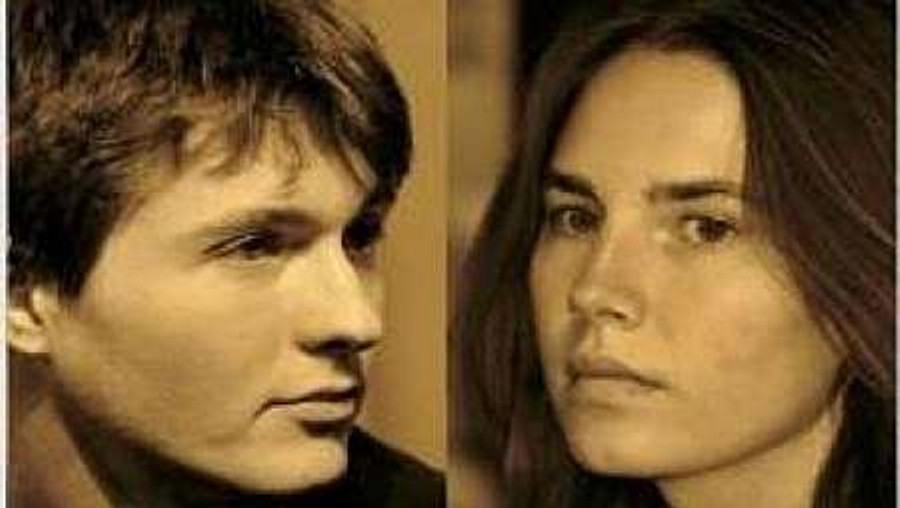
This Daily Beast report indicates that the cancelled jailhouse TV interview with Amanda Knox was a lot more firmed-up than Knox’s stepfather, Chris Mellas, seems to have claimed.
And it outlines the first phase of Knox’s Calunnia #2 trial which is based on charges brought by the interrogating police, all of whom testified at her trial that she was treated well during her interrogations as a witness and suspect. .
Click the image or link above above for the fine reporter Barbie Nadeau’s full article on some issues Knox has never been able to account for, including Knox’s callous skipping of Meredith’s memorial service.
The ten questions are all very tough, and each would also have been asked by the jury. Here they are:
.:
It’s back to court for Amanda Knox, the 22-year-old Seattle native currently serving 26 years in prison in Italy for sexually assaulting and murdering her British roommate, Meredith Kercher.
This week, Knox is expected to attend a preliminary hearing on slander charges lodged against her for accusing Perugia police of abuse. During her testimony at her murder trial last June, she accused the cops of slapping her on the back of the head during an interrogation just days after Kercher’s body was discovered in November 2007.
The police deny hitting her, and Knox’s own lawyers have never filed charges for the alleged abuse. If she is convicted of slander, a judge could add six years to her sentence….
Knox’s resurgence in the headlines was to coincide with a joint jailhouse interview she had granted to ABC News and the Italian broadcaster Mediaset’s Matrix program. But the bureau of prisons denied the interview in the final hour, effectively silencing Knox indefinitely.
A high-profile jailhouse interview with Knox is considered the Holy Grail by journalists covering the case, and the American and Italian networks have been vying for a chance to ask Knox a few questions on camera. Now it is unlikely anyone will get an interview before Knox’s appeal hearings this fall.
But if we did, there are a few questions we’d want her to put to rest.
1. Why did you and Raffaele Sollecito turn off your cell phones at the same time the night of November 1, 2007 and on again at the same time the next morning? You told the police that you and Raffaele slept late the morning of November 2, 2007, but phone records show that you both turned your phones back on very early that morning. How could that be?
2. Why were you bleeding? Your lawyers agree with the prosecution’s findings that at least one of the spots of Meredith’s blood found in the house where she was killed had your blood mixed with it. Your mother told me that you had your period. Your stepfather told others that your ear piercings were infected. Which was it?
3. Once you realized your mistake in blaming Patrick Lumumba for Meredith’s murder, why didn’t you tell the authorities? You told your mother that you felt bad about it, so why didn’t you alert an official so Patrick could be set free?
4. Why did you go with Raffaele to the police station on November 5? You were not called in for questioning. Did you realize at that time that you were both under suspicion?
5. Why weren’t your and Raffaele’s fingerprints found in your house after the murder if the two of you had spent time there that morning and the day before? Only one half-print on a glass in the kitchen has been attributed to you, yet you have claimed that you took a shower there that morning. How did you spend so much time there and leave virtually no trace?
6. Why did you take the mop and bucket from your house over to Raffaele’s house? You told the prosecutor during your testimony in June 2009 that you took the mop and bucket to his house to clean up a leak under his kitchen sink. But by your own testimony, the leak was miniscule and could have been easily cleaned up without it. What were you really doing with the mop?
7. What would you do differently if you had a chance to rewind the clock back to November 3, 2007? Would you go to the memorial service for Meredith? Would you still have gone to the police station with Raffaele? Would you have left for Germany when your aunt asked you to?
8. What do you think happened the night Meredith was killed? You have professed your innocence. Who do you think killed her and under what circumstances?
9. What do you really think of the Italian justice system? You told an Italian parliamentarian that you got a fair trial, and you even thanked the prosecutors for trying to solve the mystery of Meredith’s death, but your supporters at home in Seattle maintain that the Italian system is corrupt and unfair. What is your real view?
10. Is there anything you wish you would have said in court during your trial? You talked about your vibrator and about how you did not want an assassin’s mask forced on you. But in your final appeal after the closing arguments on December 4, 2010, why didn’t you say the words, “I did not kill Meredith Kercher?” Raffaele did when it was his turn to speak. Why didn’t you?
Our posting soon of the judges’ sentencing report will open up dozens of new questions for Knox. Such as: “How did you track Meredith’s blood into your own room and leave three traces revealed by luminol?”
Tuesday, May 04, 2010
From The Book Darkness Descending: The Insights On Rudy Guede
Posted by Peter Quennell
Above and just below: Abidjan, the very attractive West African city where Rudy Guede was born and where he lived until he was five.
Darkness Descending includes this well-researched and revealing portrait below of Rudy Guede and the two traumatic experiences that really threw him: his moving in with the Caporali family, and the collapse of the restaurant in northern Italy which briefly employed him.
No claims here about Rudy Guede being a drifter or drug-dealer or dangerous knife-wielder or petty criminal.
None of those things are confirmed by the record or the Micheli report, and few or none in Perugia or Italy generally seem to believe Rudy Guede was the sole perpetrator or even the main perpetrator of Meredith’s death.

(Above: the downtown of Abidjan, the economic and former political capital of the Ivory Coast)
From Darkness Descending by Paul Russell and Graham Johnson (Pocket Books) pages 292 to 296
Unlike Amanda and Raffaele, the background of Rudy Hermann Guede seemed to inspire a degree of sympathy in readers and viewers.
At least once the undercurrents of reactionary racism had run its course and readers were able to identify with Guede the individual.
Guede had been dragged up a virtual orphan. He seemed to be luckless, directionless, prone to following others into trouble, his carers said. He’d never had a paternal figure to look up to or guide him.
That, and the fact that once he’d been caught he seemed to be at least trying to tell the truth about his involvement with Meredith, gave him a certain credibility.
He was often given a fair hearing in the papers for not trying to evade guilt by changing his story. Editors and readers seemed to appreciate that he had not relied on high-powered family connections to duck out of one of the most tragic cases that had ever come before them.

(From Piazza Italia at the south end of the walled city - Rudy Guede first lived off there to the south-east)
Guede came to Italy in 1992, when he was five years old. His father Roger had emigrated from the Ivory Coast a few years before at a time when the Italian economy needed new manpower to fuel the country’s post-industrial boom…
Roger Guede had trained as a teacher in the former capital city of the Ivory Coast, Abidjan, where his wife still lived with little Rudy, but in Italy he found work as a bricklayer.
Life was hard because of exploitation, denial of workers’ basic rights and rampant illegal labour.
After five years he was granted a regular resident’s permit and returned to Abidjan to his wife, to see if he could take the young Rudy back to Italy with him. She agreed that in Italy he would have a chance of a better life.
Roger and Rudy found a flat in the shabby low-lying suburb of Perugia called Ponte San Giovanni. The neighbourhood was not at the top of the hill, with its wide vistas, ancient buildings and air of academia.
Roger’s life had no room for aspiration or fanciful gap-year adventures. He settled for a seedy new-build on the valley floor near the railway station. An unhealthy stream meandered through the projects like a sewer.
Still, it was better than the shanty town where Rudy’s mother was eking out a bare existence.
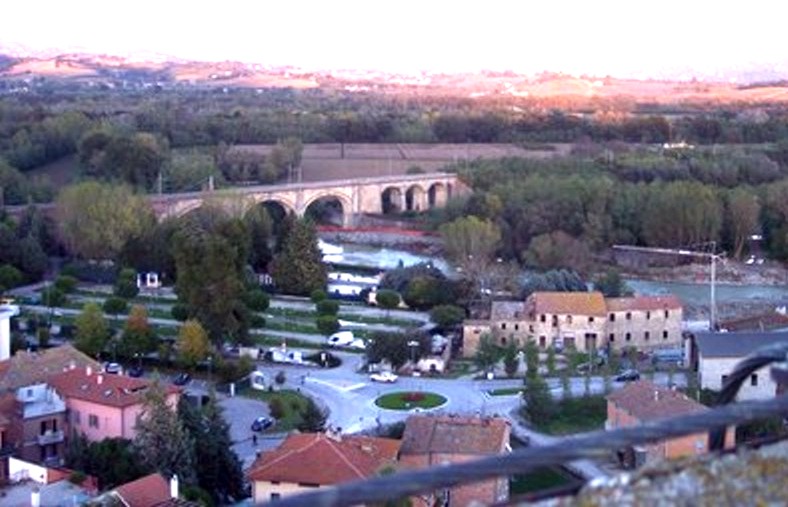
[Shots here and just below of Ponte San Giovanni, the town just to the east where Guede first lived]
New to immigration, Italy’s attitude to race relations has often been schizophrenic. Far-right extremists have been known to whip up dissension. But in Perugia, a small community like many that made up the backbone of Italian society, Roger and his son were welcomed.
His presence stimulated the lively cutiosity of Italians, not their hostility. The kindness of his neighbours and the willingness of social services to offer him childcare were proof of that, and he was free to hit the road to find building-site work.
During these absences Rudy was fostered by local families. One of his first full-time carers was a Mrs Mancini, who had been his maths teacher at school. She never lost interest in him and was to be like a second mother.
Rudy also struck up a lifelong friendship with her son Gabriele and another schoolmate, Giacomo Benedetti. The fabric of a closeknit Italian working-class community felt like a protective cloak and Rudy thrived.
His teachers and foster families all say that he was a quiet child, well behaved and responsible. He had moments of daydreaming stupidity, but no more than other kids.
He was good at basketball - tall, athletic and serious. The local professional basketball team was sponsored by one of Italy’s most successful companies, Liomatic, who manufactured coffee dispensers - a link that would later change the course of his life.
One day, Rudy’s dad went home to Abidjan to renew his passport, but civil war broke out when he was in the country and instead of spending two weeks away from his son he was trapped for six months, as strife raged in the Ivory Coast.
Back in Italy, the social services stepped in with a view to formalizing Rudy’s foster status and finding a long-term home for him.
Rudy was unhappy but he coped with the loneliness and uncertainty with admirable courage. He didn’t complain. And he was soon rewarded. Astonishingly, he was catapulted into the heart of one of Italy’s richest families.
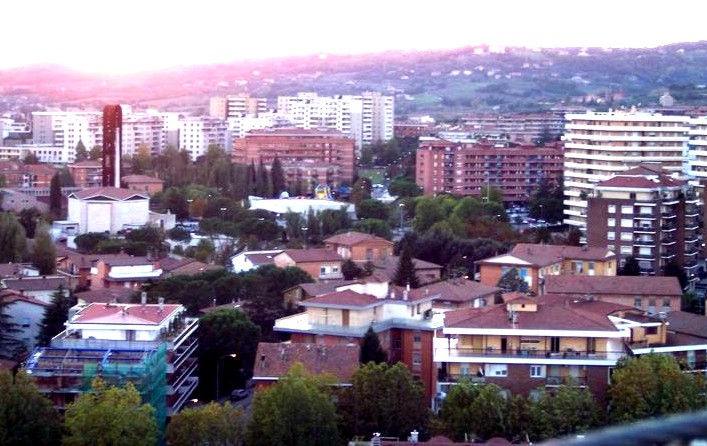
[Another shot of Ponte San Giovanni, where Guede in his early days apparently lived happily]
His change of fortune was like something out of the plot of the musical Annie. Rudy had met one of the Caporali sons at basketball. Now the family wanted to officially take him in as one of their own. He never lived with Roger again.
The change wasn’t smooth. Rudy found it difficult to adapt. When he moved out of Ponte San Giovanni, he lost touch with many of his old friends, which he found particularly hard.
They had been the bedrock in what had so far been a rather unstable family life. He soon missed the informality, the lack of pressure to succeed and the maternal bonds that Italian families are famous for.
It wasn’t long before his new father figure, Paolo Caporali, was calling Rudy ‘an inveterate liar’. He skipped school and spent his time in front of the television or on PlayStation. Caporali’s wife and kids were much kinder in their view:
Rudy was introverted and shy. He lied to protect himself, but not maliciously to hurt others or gain personal advantage.
The move from a poor area to the home of the super-rich Caporali family had confused Rudy and, to some degree, had embarrassed him.
His basketball trainer Roberto Segolini said Rudy was friends with everyone and never missed a training session. Where he could prove his worth and show success to his new high-status family, Rudy thrived.
With such a chequered school career, Rudy would find it hard to find a job that suited him once he left school. But at the age of nineteen he went to stay with an aunt in Lecco and landed a job as a waiter in Pavia.
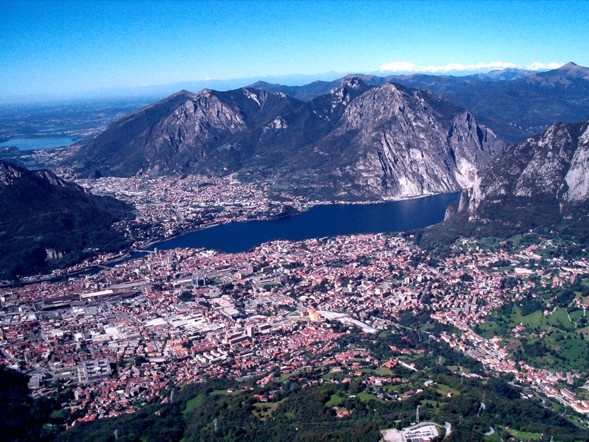
[Shot of Lecco north of Milan where at age 19 Rudy Guede moved to live with an aunt]
Finally, he had found his way. He was ecstatic. He was now going to prove that he could knuckle down and stand on his own two feet. He thought about learning the trade and one day opening a restaurant.
But as soon as he settled in, the rug was pulled from under him - his employer was arrested and the business folded.
To someone with a fragile view of himself, this chance setback took on a great and doom-laden significance. Rudy blamed himself and worried about how he would explain his bad luck to the Caporalis.
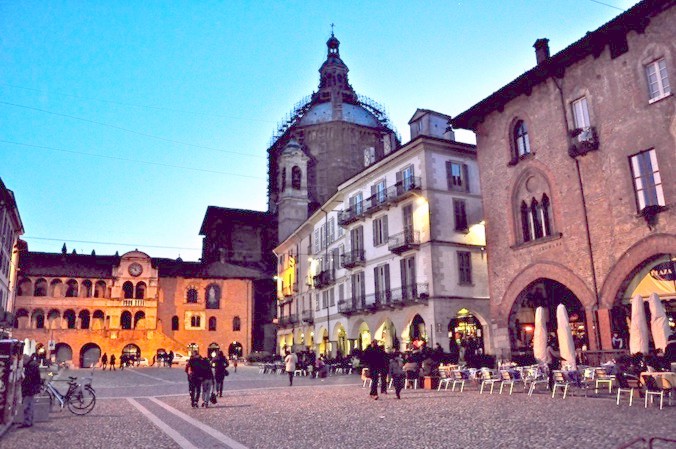
[Shot of Pavia south of Milan where Rudy Guede worked as a waiter till the restaurant collapsed]
Confidence shattered, he fled back to Perugia in shame. It was July 2007 and the beginning of the long summer that would end in tragedy.
The Caporalis were desperate to bolster his self-esteem. In August they found him a gardener’s job at a restaurant they owned out of town.
He stayed with the Mancinis, where the father and mother made sure he got up early to catch the bus. But the rot had set in; he wanted to live where the excitement was.
He was distracted by the scallywag antics of the lads in Perugia, who never seemed to work but always had money, and by the beautiful students from allover the world who were descending on the University to find digs and party.
Amanda and Meredith would be among them. Once he failed to go to work for a whole week, claiming he had flu and snivelling unconvincingly over the phone. He was sacked.
He lived off his savings until 2 November, when the murder and his doomed getaway would end any hopes he had of turning his life around.
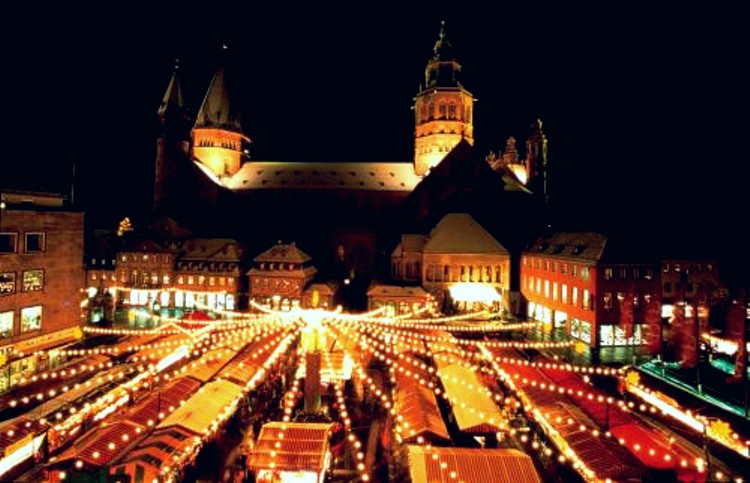
[Shot of Mainz on the Rhine between Frankfurt and Bonn where Rudy Guede was captured]
Monday, May 03, 2010
From The Book Darkness Descending: The Insights On Knox And Sollecito
Posted by Peter Quennell
This is Hamburg above. And that is Berlin and its parliament (the Bundestag) below.
Amanda Knox speaks German and she spent several months in these two cities, staying for some weeks in in Hamburg with her relatives, and several days in Berlin, before moving to Perugia to start her study period there.
Darkness Descending is the book on Meredith’s case by two British writers from which we excerpted on Meredith a few days ago.
As far as we know the writers did not visit Seattle, and their focus is more generally on Italy and to some extent the UK. But they did offer this brief take on Amanda Knox, and also one on Raffaele Sollecito.
**********
From Darkness Descending by Paul Russell and Graham Johnson (Pocket Books) pages 291 and 292
Meredith had enjoyed making the pop video with her University of Leeds friends, but Amanda’s summer job, before travelling around Europe and going to Perugia, had not been so successful.
A politically well-connected uncle in Hamburg had got her an internship to die for - a job working for a German MP at the Bundestag. Kindly Uncle Uwe also set Amanda up with a flat on the .outskirts of Berlin.
Astonishingly, two days later, his seemingly ungrateful niece walked out on the job without telling anyone, moaning that she had nothing to do and she wasn’t sure if she was getting paid. Again, money was a big feature in her thoughts.
She’d spent most of the time reading Harry Potter and showed no curiosity about how the parliament or the high-powered people in there worked. She ignored conversations about its history and architecture.
After walking out, she spent her time drinking wine in the local bars and reading more Harry Potter.
Two days later she left Berlin for Hamburg, where her uncle was waiting for her. He was furious - she had let him down.
It seems Amanda craved excitement on her terms, usually based on getting drunk and goofing around.
Her friends said she simply feared boredom like any young girl. She showed a healthy streak of youthful carelessness, they said, no worse or better than anyone else. A video posted on YouTube showed her drunkenly giggling in a friend’s kitchen after downing shots.
On campus, back in the US, Amanda had been fined for being drunk and disorderly at a party held in a fellow student’s house. During the incident she had also insulted the police.
However, her defenders gave another version, portraying a magnanimous Amanda. They said that in fact she was courageously fronting up for her underage friends, who were in no state to talk to the police; she was the only one sober enough to handle the situation.
A big plus in her character assessment, they said, possibly displaying a sense of chivalry that would later get her into deeper trouble in Perugia.
Despite her college party lifestyle, there was no denying that Amanda was clever and that she could compartmentalize her life.
She made the Dean’s List, an elite commendation of the University of Washington reserved for the institution’s brightest students, and an honour that would ultimately qualify her for a prestigious and sought-after place on the study-abroad exchange programme.
If Amanda wanted something, she would go all out to get it, no messing around.
Raffaele Sollecito’s later years were quite different: he seemed to laze around and evade responsibility.
He posted pictures of himself on the internet wrapped in blood-covered bandages, brandishing a meat cleaver, and wrote a weird story to go with the images. In a blog he expressed satisfaction at once being lodged in the same hostel as the infamous ‘Monster of Foligno’, a murderer who slaughtered two youths in the 1990s.
And yet his new-found fascination with gory horror and violent comics would have surprised the friends he left behind at Licea Scientifico Einstein secondary school at Molfetta.
They said Raffaele suffered from excessive softness - his kickboxing instructor recalled that he even hesitated when kicking out, for fear of hurting the hardened expert.
***********
A few interesting insights there, though we could use more on Sollecito. For most of it, this is a pretty good book, the weak part being the closing analysis of the evidence. Two small corrections.
- The house where the notorious rock-throwing party took place was where Knox herself was living at the time. See here.
- Knox was not on an official University of Washington study-abroad program, as the university has rather anxiously tried to make plain. See here.
If Knox had indeed been on a proper study-abroad program - something many caring parents actually insist upon - her behavior might have been more restrained. She may not have moved in with Sollecito for one thing.
She may not have hit the drugs so hard. And she would not have run so desperately short of money, just when Patrick was apparently about to hire Meredith to replace her. No monthly checks were arriving from Seattle.
Maybe the second correction is not such a small one.
In fact, it is a pity that no writers have really explored all of this - there is, if anything, a surfeit of motives in this case, and the writers might be able to narrow them down.
Although he went to highschool in Molfetta (bottom shot here) and the book is correct on that, Raffaele Sollecito actually comes from Giovinazzo which is ten minutes drive south along the coast.
Both are north of Bari, where his father practices medicine.
Friday, April 16, 2010
Italian Media Reporting Impartially On Prosecution Appeal Filed For Increased Sentences
Posted by Peter Quennell
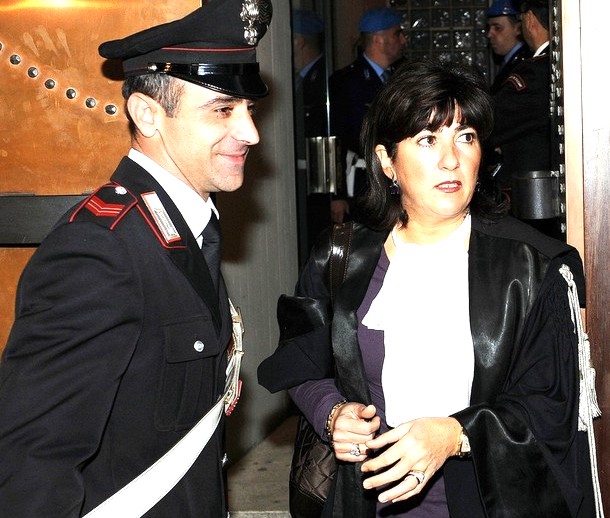
[Above: Prosecutor Manuela Comodi.]
In light of the judges’ sentencing report (due soon here and on PMF in English) the prosecution have filed an appeal that Knox’s and Sollecito’s sentences be revised upward to life.
Life sentences were their original request to the court last November, and the Italian media in November and early December largely anticipated at least 30 years. The 26 years for Knox and 25 for Sollecito came to many as a surprise.
First legal advice from the Italian lawyers on our team is that at minimum this could firm up the existing sentences, and at maximum Knox and Sollecito actually could be looking at life behind bars - such upward revisions do happen.
Remember that the Italian public are way better informed on the cruel depravity of the crime than the British or American publics.
And that Knox’s cold smug antics on the stand, during which she spoke flippantly and callously of Meredith’s passing, seemed to leave few in Italy feeling any real sympathy.
Grounds for the appeal are twofold: (1) That the judges’ arguments for the granting of extenuating circumstances was a stretch (such as the conclusion that the duvet placed over Meredith was a sign of remorse), and (2) That the judges’ dismissing of aggravating circumstances was in effect a shortfall (such as the possibility that Meredith could have been saved if they had not removed her phones, locked the door, and walked off).
The posters here and on PMF may be the largest group in the English-speaking world so far to have actually read the judges’ sentencing report.
Typically we are finding the description of the evidence to be extremely detailed and quite remorseless. There is very, very little room for argument about it, and the defense teams in the appeals will have an even tougher time laying a paw on it than they did in the course of the trial. We are highly impressed by this - this case NEEDED this to put an end to the endless myth-mongering, and to give Meredith’s family and friends hope of some respite.
But the motives assumed in the sentencing report, the judges’ timeline (which differs from both Micheli’s and Mignini’s), and the instigating role given to Rudy Guede, were interpretations the sentencing judges made which the appeals judges may not buy into.
The defense teams will not be resting any easier in light of this. The pressures may be mounting for the lawyers and defendants to finally split three ways - we will have a major post next week on their three-way herding of one another over the past two-plus years.
And perhaps enough pressure on each of the defendants to show real remorse and finally tell their version of all.






